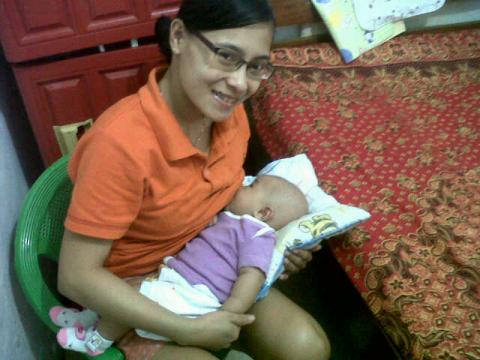My determination to breastfeed helped others too

By: Lisa Hernawati, World Vision field facilitator; Surabaya, Indonesia
When I was blessed with my second child in 2010, I was determined to breastfeed my baby to show my responsibility and love as a mother.
It was important to me because of my job. I did not want to be a person who was only capable at promoting mothers to breastfeed. I also wanted to show that a busy working woman could breastfeed her baby and donate milk to others.
It was not easy because my own parents did not agree with the plan. My mother reminded me that my first baby born in 2004 was given banana when he was still 40 days old.
I persuaded her to give me a chance to practice my knowledge, but even then, she wanted to add a condition. “If bad things happen to your baby because of this, I will not help you take care of him,” my mother warned.
As well, I knew that I would need a caesarean and that this makes it more difficult to successfully breastfeed.
So in the delivery process of my second child, I requested to the doctor that I would only be locally anesthetized to make it possible to breastfeed my baby immediately after the baby was born.
I faced another challenge when we discovered that my baby’s billirubin (a liver fluid) was high, making him jaundiced. He had to be placed in an incubator for 24 hours.
“What a stubburn child! If he was given formula milk, he would not have this yellow skin!” said my mother.
I expressed my breastmilk, put it in a bottle and started to feed my baby using the bottle. Another challenge appeared when my baby refused to drink breastmilk directly from my breast. If I tried to breastfeed directly, he cried and refused to drink. So, every two hours, I expressed and put it in a freezer, preparing for my new son to have this vital nutrition every day.
It was worth it. When my baby was one month old, I suffered from chicken-pox so I had to be separated from my baby. Fortunately, there were enough stock of breastmilk in freezer. I continued to express but discarded the breastmilk because of possible contamination from the medicine I was taking.
Then it was my baby’s turn to have the chicken-pox. His whole body from his head to the bottom of his feet was covered with spots. But it only took three days for the whole condition to clear again. I know it was because I mixed his medicine with breastmilk and not with drinking water. The doctor could not believe that my baby recovered so quickly. “This is the advantage of breastmilk,” he said.
My little boy grew so well that my neighbours and relatives were amazed. They began to mention this to my mother, and she said with pride that it was all due to breastmilk!
Enough milk to share
My baby still did not drink directly from my breast, and one day the doctor warned me that I might not be able to keep producing to feed him through to six months. I went crazy then, collecting and placing bottles not only in my freezer but also in the freezer of relatives and in the office! Then one day I found that the freezer had failed and I’d wasted 250 bottles.
I wept my heart out. But then I suddenly thought – if I donated the breastmilk I wouldn’t have to freeze it, and I would be able to keep lactating for longer. So I told my doctor that’s what I wanted to do.
First I donated my milk to twin baby girls who were born premature and in grave danger because of their under-developed bodies. After that I gave it to a baby who had bronchitis, another who had lung disease and two other babies whose mothers could not produce enough milk. That’s seven babies I fed besides mine in the first six months. Later I found that all of these babies recovered from their illnesses and grew healthy and strong. And because I was doing this, the amount actually increased.
It makes me so happy to share this story along with my knowledge and experience when I work in my community. Right now I am motivating eight breastfeeding mothers to increase their confidence in the face of public opinion, and to keep it up breastfeeding their babies for the minimum six months that is recommended.